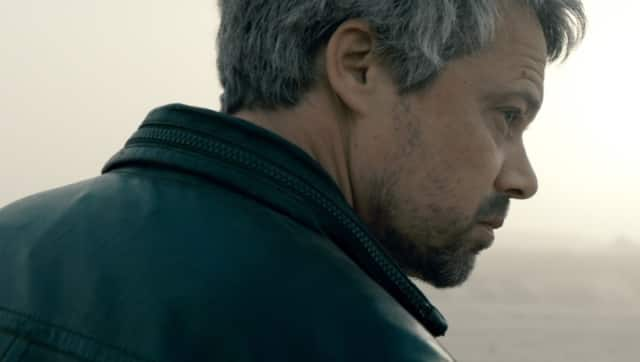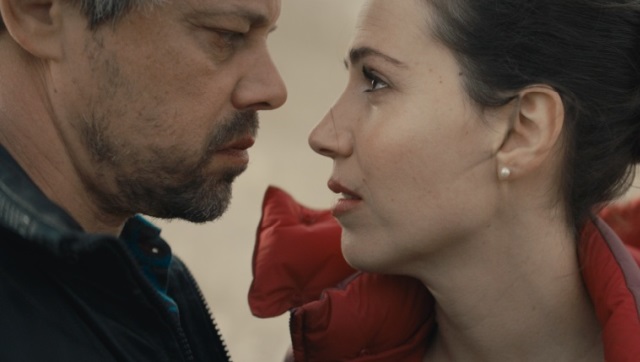Language: Hebrew The title of Nadav Lapid’s latest feature — Ahed’s Knee — may echo an Erich Rohmer classic. But the two filmmakers and their films couldn’t be any different. While Claire’s Knee situated an older man’s consuming obsession for a pretty teenager as a part instead of a whole, Ahed’s Knee is the kicking-off point for a lacerating tirade against censorship and the Israel-Palestine conflict. Ahed Tamimi, she of the knee, is a Palestinian activist who became a media sensation at the age of 16 when she slapped one of the Israeli soldiers who wounded her cousin at a demonstration near her home in the West Bank. Arrested and sentenced for eight months, she became a hero for the Palestinians. Not so much for the Israelis obviously, seeing as one of the MPs proposed she be shot in the knee so she may never walk again. This 2017 incident is the subject of the new film-within-the-film by Lapid’s alter-ego Y (Avshalom Pollak). He is in the middle of auditions for the project when he accepts an invitation to present one of his earlier films in a remote village in the desert region of Arava. There, he meets the cordial hostess Yahalom (Nur Fibak), a representative of the Israeli Ministry of Culture who asks him to sign a document of topics he can and can’t discuss. This sets the stage for a virtual two-hander as Y attempts to reconcile his love-hate relationship with Israel, as well as grapple with the everyday hypocrisies that pervade its government, its military and its Palestine policy. [caption id=“attachment_10777201” align=“alignnone” width=“640”]
 Avshalom Pollak as Y[/caption] A feverish rage erupts and runs through every aspect of Ahed’s Knee, a confrontational film whose sense of urgency is written into its very form. It was penned in two weeks, and production wrapped up in 18 days. There is discernible anguish to Lapid’s assaultive camerawork, which erratically switches from probing close-ups to wide shots. Emotionally attuned to Y, the camera wobbles, jolts and spirals, mirroring his subjectivity. At one point, Y dances to Vanessa Paradis’ “Be My Baby” amidst the dunes of Arava, and the camera does likewise. From time to time, it swings a whole 180 into the sky or the landscape to take a breather. These destabilising rotations convey the inner turmoil of a man unable to find his footing. Y’s anxieties indeed are Lapid’s own, both artists on edge over their struggle to compartmentalise the personal and the political. Both wrestling with their country’s moral failings and making art that decries a system they are a part of. Being an Israeli citizen who is required by law to serve in the military or face persecution, how does one resist and refuse to be complicit in an illegal occupation? Yoav, the 20-something Israeli soldier in Lapid’s previous film Synonyms, fled to Paris, hoping to adopt a new motherland. Just like Yoav, Y too is confronted by traumatic memories of his time in the military. The motherland and the military aren’t the only thing on Y’s mind. His ailing mother is too. Throughout the film, we see Y leave messages and recordings to his mom, who also happens to be his co-screenwriter. Lapid’s own mother Era was the editor on all his films before she succumbed to cancer. [caption id=“attachment_10777211” align=“alignnone” width=“640”] Nur Fibak (R) as Yahalom[/caption] The central conflict of Ahed’s Knee itself is based on a personal experience: when Lapid was made to sign a document by the Ministry before presenting The Kindergarten Teacher. So, what unfolds in the film is a sort of wish fulfilment, a cinematic realisation of what he couldn’t do in reality. Y and Yahalom engage in easy, flirty chit-chat before her Ministry request riles him, triggering an extended monologue about the evolving nature of art, identity and truth in a country eager to restrict freedom of expression. Oscillating between personal recollections and emphatic denunciations, the monologue is as much a dialogue with his country. As he pours his rage into a polemic covering every issue that has been weighing on him, he falls to his knees, clinging on tight to Yahalom for support. Only, he is a man so consumed by rage he is even ready to humiliate Yahalom in his righteous rebellion. Intent on getting her to admit her complicity in this system of oppression, he fails to realise she is but a cog in the machine, playing by the rules because she doesn’t have the power to change them. Nor does he.
A work of autofiction shot straight from the hip, Ahed’s Knee is a filmmaker’s cri de coeur for artistic freedom.
The final monologue best sums up the film itself: it is impassioned, belligerent, righteous and bruising. It offers Y, and Lapid, a cathartic outlet to exorcise the despair-turned-rage about state-sanctioned oppression, and at the same time, a way to process the loss of his mother. If Lapid’s films tend to be unclassifiable and challenging, Ahed’s Knee takes it to a whole new level. Be warned: This is going to be anything but a comfortable watch. If you make it to the end, chances are it will barrel its way forever into your consciousness. Ahed’s Knee is now streaming on MUBI Rating: * * * *
Prahlad Srihari is a film and music writer based in Bengaluru. Read all the **_Latest News_** _,_ **_Trending News_** _,_ **_Cricket News_** _,_ **_Bollywood News_** _,_ **_India News_** and **_Entertainment News_** here. Follow us on Facebook_,_ Twitter and Instagram_._


)
)
)
)
)
)
)
)
)



